2021年外研版英语中考专题复习讲义:情态动词(含答案)
文档属性
| 名称 | 2021年外研版英语中考专题复习讲义:情态动词(含答案) | 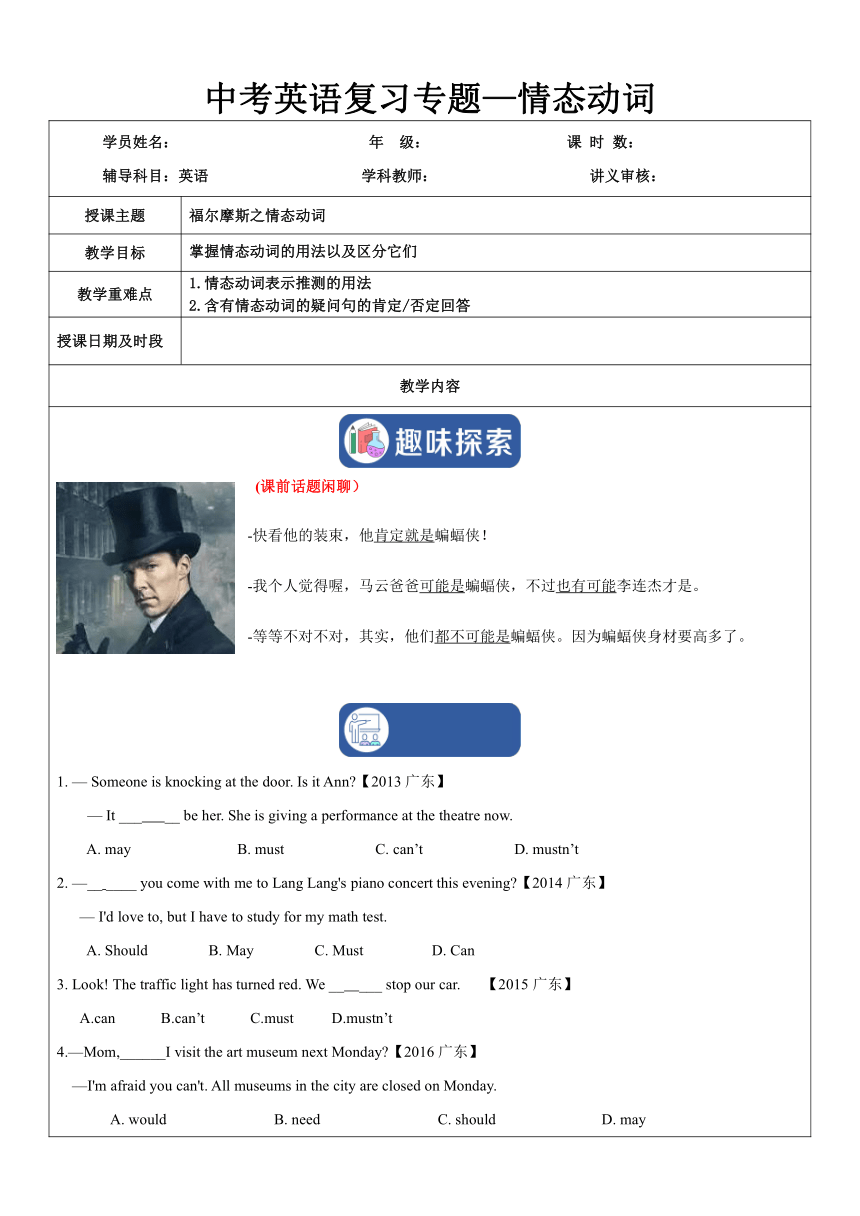 | |
| 格式 | doc | ||
| 文件大小 | 513.9KB | ||
| 资源类型 | 教案 | ||
| 版本资源 | 外研版 | ||
| 科目 | 英语 | ||
| 更新时间 | 2021-04-21 13:53:38 | ||
图片预览

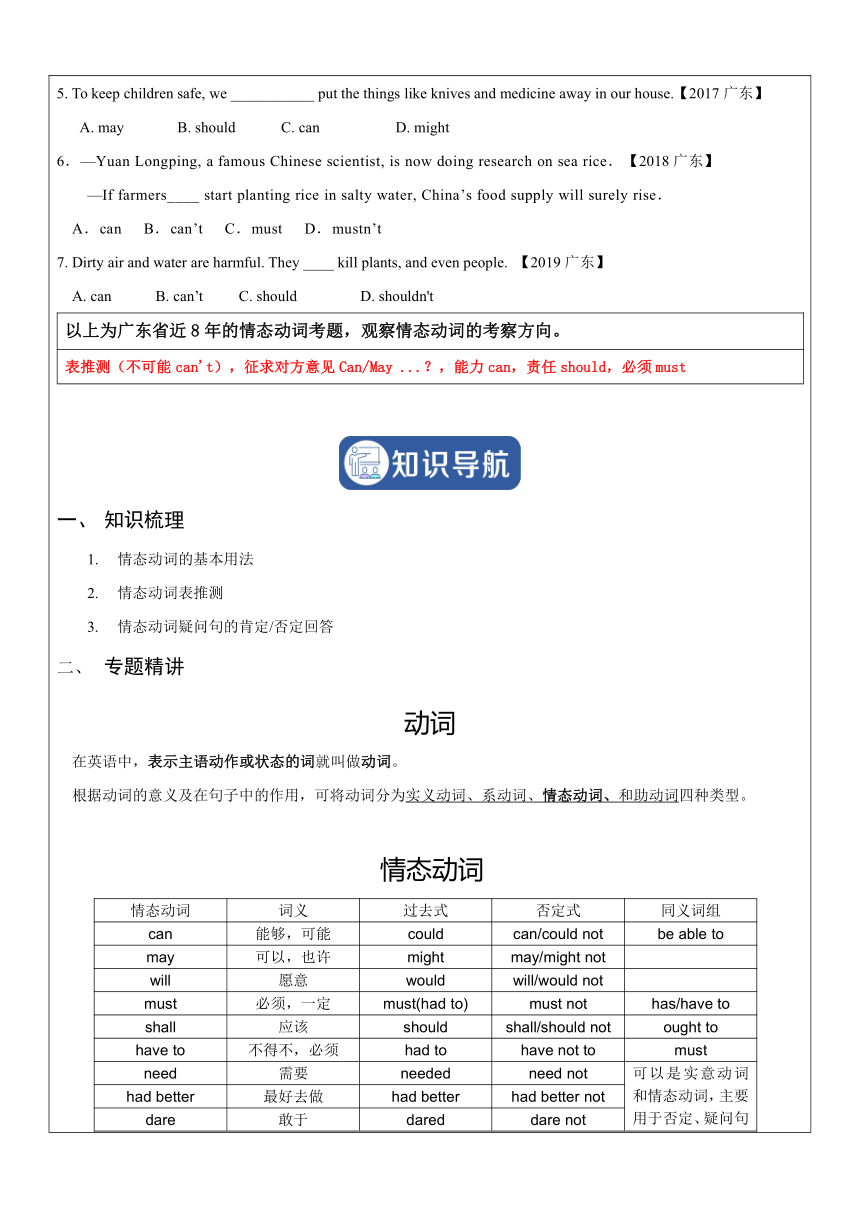
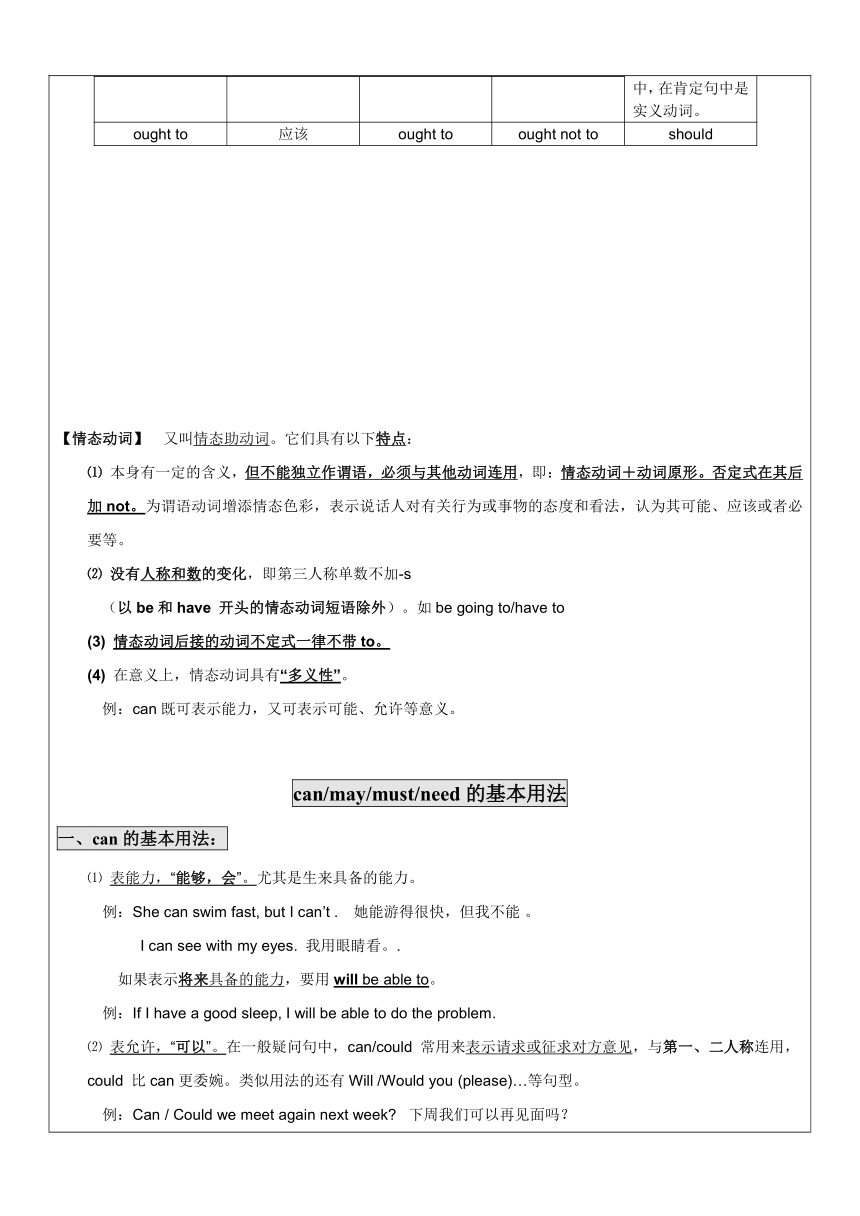
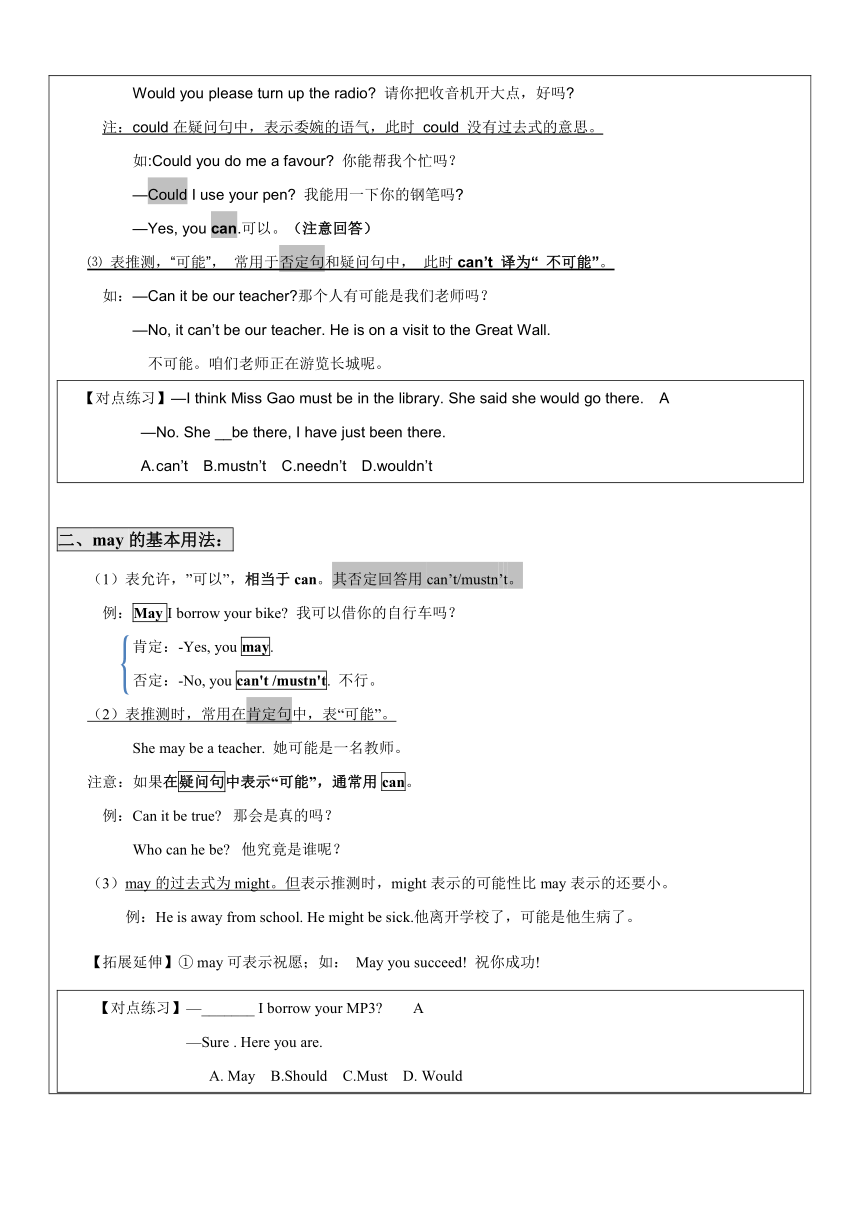
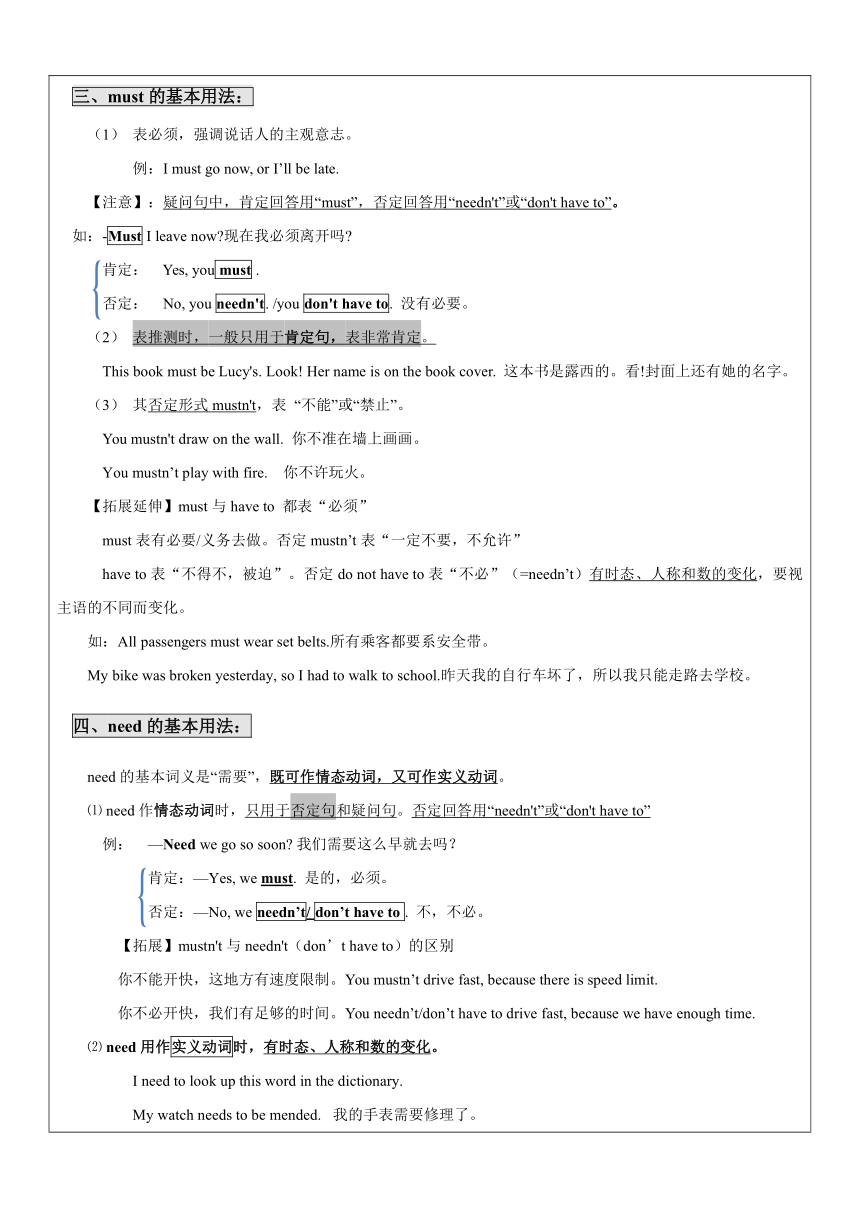
文档简介
中考英语复习专题—情态动词
学员姓名: 年 级: 课 时 数: 辅导科目:英语 学科教师: 讲义审核:
授课主题 福尔摩斯之情态动词
教学目标 掌握情态动词的用法以及区分它们
教学重难点 1.情态动词表示推测的用法
2.含有情态动词的疑问句的肯定/否定回答
授课日期及时段
教学内容
(课前话题闲聊)
-快看他的装束,他肯定就是蝙蝠侠!
-我个人觉得喔,马云爸爸可能是蝙蝠侠,不过也有可能李连杰才是。
-等等不对不对,其实,他们都不可能是蝙蝠侠。因为蝙蝠侠身材要高多了。
1. — Someone is knocking at the door. Is it Ann?【2013广东】
— It ___ __ be her. She is giving a performance at the theatre now.
A. may B. must C. can’t D. mustn’t
2. —__ ____ you come with me to Lang Lang's piano concert this evening?【2014广东】
— I'd love to, but I have to study for my math test.
A. Should B. May C. Must D. Can
3. Look! The traffic light has turned red. We __ ___ stop our car. 【2015广东】
A.can B.can’t C.must D.mustn’t
4.—Mom,______I visit the art museum next Monday?【2016广东】
—I'm afraid you can't. All museums in the city are closed on Monday.
A. would
B. need
C. should
D. may
5. To keep children safe, we ___________ put the things like knives and medicine away in our house.【2017广东】
A. may B. should C. can D. might
6.—Yuan Longping,?a famous Chinese scientist,?is now doing research on sea rice.【2018广东】
—If farmers____ start planting rice in salty water,?China’s food supply will surely rise.
A.can ???B.can’t ???C.must ???D.mustn’t
7. Dirty air and water are harmful. They ____ kill plants, and even people. 【2019广东】
A. can B. can’t C. should D. shouldn't
以上为广东省近8年的情态动词考题,观察情态动词的考察方向。
表推测(不可能can't),征求对方意见Can/May ...?,能力can,责任should,必须must
知识梳理
情态动词的基本用法
情态动词表推测
情态动词疑问句的肯定/否定回答
专题精讲
动词
在英语中,表示主语动作或状态的词就叫做动词。
根据动词的意义及在句子中的作用,可将动词分为实义动词、系动词、情态动词、和助动词四种类型。
?情态动词
情态动词
词义
过去式
否定式
同义词组
can
能够,可能
could
can/could not
be able to
may
可以,也许
might
may/might not
will
愿意
would
will/would not
must
必须,一定
must(had to)
must not
has/have to
shall
应该
should
shall/should not
ought to
have to
不得不,必须
had to
have not to
must
need
需要
needed
need not
可以是实意动词和情态动词,主要用于否定、疑问句中,在肯定句中是实义动词。
had better
最好去做
had better
had better not
dare
敢于
dared
dare not
ought to
应该
ought to
ought not to
should
【情态动词】 又叫情态助动词。它们具有以下特点:
⑴ 本身有一定的含义,但不能独立作谓语,必须与其他动词连用,即:情态动词+动词原形。否定式在其后加not。为谓语动词增添情态色彩,表示说话人对有关行为或事物的态度和看法,认为其可能、应该或者必要等。
⑵ 没有人称和数的变化,即第三人称单数不加-s
(以be和have 开头的情态动词短语除外)。如be going to/have to
(3) 情态动词后接的动词不定式一律不带to。
(4) 在意义上,情态动词具有“多义性”。
例:can既可表示能力,又可表示可能、允许等意义。
can/may/must/need的基本用法
一、can的基本用法:
⑴ 表能力,“能够,会”。尤其是生来具备的能力。
例:She can swim fast, but I can’t . 她能游得很快,但我不能?。
I can see with my eyes. 我用眼睛看。.?
如果表示将来具备的能力,要用will be able to。
例:If I have a good sleep, I will be able to do the problem.?
⑵ 表允许,“可以”。在一般疑问句中,can/could 常用来表示请求或征求对方意见,与第一、二人称连用,could 比can更委婉。类似用法的还有Will /Would you (please)…等句型。
例:Can / Could we meet again next week?? 下周我们可以再见面吗?
Would you please turn up the radio? 请你把收音机开大点,好吗?
注:could在疑问句中,表示委婉的语气,此时 could 没有过去式的意思。
如:Could you do me a favour? 你能帮我个忙吗?
—Could I use your pen? 我能用一下你的钢笔吗?
—Yes, you can.可以。(注意回答)
⑶ 表推测,“可能”, 常用于否定句和疑问句中, 此时can’t 译为“ 不可能”。
如:—Can it be our teacher?那个人有可能是我们老师吗?
—No, it can’t be our teacher. He is on a visit to the Great Wall.
不可能。咱们老师正在游览长城呢。
【对点练习】—I think Miss Gao must be in the library. She said she would go there. A
—No. She __be there, I have just been there.
can’t B.mustn’t C.needn’t D.wouldn’t
二、may的基本用法:
(1)表允许,”可以”,相当于can。其否定回答用can’t/mustn’t。
例:May I borrow your bike? 我可以借你的自行车吗?
肯定:-Yes, you may.
否定:-No, you can't /mustn't. 不行。
(2)表推测时,常用在肯定句中,表“可能”。
She may be a teacher. 她可能是一名教师。
注意:如果在疑问句中表示“可能”,通常用can。
例:Can it be true?? 那会是真的吗?
Who can he be?? 他究竟是谁呢?
(3)may的过去式为might。但表示推测时,might表示的可能性比may表示的还要小。
例:He is away from school. He might be sick.他离开学校了,可能是他生病了。
【拓展延伸】① may可表示祝愿;如: May you succeed! 祝你成功!
【对点练习】—_______ I borrow your MP3? A
—Sure . Here you are.
A. May B.Should C.Must D. Would
三、must的基本用法:
表必须,强调说话人的主观意志。
例:I must go now, or I’ll be late.?
【注意】:疑问句中,肯定回答用“must”,否定回答用“needn't”或“don't have to”。
如:-Must I leave now?现在我必须离开吗?
肯定: Yes, you must .
否定: No, you needn't. /you don't have to. 没有必要。
表推测时,一般只用于肯定句,表非常肯定。
This book must be Lucy's. Look! Her name is on the book cover. 这本书是露西的。看!封面上还有她的名字。
其否定形式mustn't,表 “不能”或“禁止”。
You mustn't draw on the wall. 你不准在墙上画画。
You mustn’t play with fire. 你不许玩火。
【拓展延伸】must与have to 都表“必须”
must表有必要/义务去做。否定mustn’t表“一定不要,不允许”
have to表“不得不,被迫”。否定do not have to表“不必”(=needn’t)有时态、人称和数的变化,要视主语的不同而变化。
如:All passengers must wear set belts.所有乘客都要系安全带。?
My bike was broken yesterday, so I had to walk to school.昨天我的自行车坏了,所以我只能走路去学校。
四、need的基本用法:
need的基本词义是“需要”,既可作情态动词,又可作实义动词。
⑴ need作情态动词时,只用于否定句和疑问句。否定回答用“needn't”或“don't have to”
例: —Need we go so soon??我们需要这么早就去吗?
肯定:—Yes, we must. 是的,必须。
否定:—No, we needn’t/ don’t have to .??不,不必。
【拓展】mustn't与needn't(don’t have to)的区别
你不能开快,这地方有速度限制。You mustn’t drive fast, because there is speed limit.
你不必开快,我们有足够的时间。You needn’t/don’t have to drive fast, because we have enough time.
⑵ need用作实义动词时,有时态、人称和数的变化。
I need to look up this word in the dictionary.?
My watch needs to be mended.? 我的手表需要修理了。
五、should的基本用法:
(1)表责任或义务,意为“应该”,用于各种人称。
You should be polite to your teachers.?? 你对老师应该有礼貌。
(2)表推测,意为“想必一定、照说应该、估计”等。
The film should be very good as it is starring first-class actors.?? 这部新电影是一流演员主演的,估计拍得很好。
六、will的基本用法:
(1)表意愿,用于各种人称。
I will do anything for you.?? 我愿为你做任何事。
(2))will在疑问句中用于第二人称,表示询问对方的意愿或向对方提出请求。
Will you close the window?? 请你把窗户关上好吗?
七、shall的基本用法:
shall(多用于第一人称)表示征求对方意见;will (用于第二人称)表示说话人向对方提出请求和建议,过去式为would。
例:Shall we go out for a walk? 我们出去散步好吗?
Would you please come a little earlier?请你来早一点好吗?
在英语中,我们可以用多种方式提建议或征求意见。
(1)用“Let's do...”。例:Let's go for a walk after supper.
(2)用“What/How about...?”;about后接名词或动词ing形式。
例:What about/How about a drink? What about/How about taking Tom with us?
(3)用“Why not...?”,表示“何不…”not面后接动词原形。“Why not...?”实际上是“Why don't you/we...?”的简略形式。
例:Why not meet at the school gate at eight? /Why don't we stay here another day?
(4)用“Would you like...?”,意思是“你想要……吗?”Would you like后可接名词或不定式。
例:Would you like a cup of tea?
Would you like to go and see her?
因此,如果我们说:“去游泳好吗?”英语中可有这样几种表达法:
Shall we go for a swim?
Let's go for a swim,shall we?
What about/How about going swimming?
Why not go for a swim?
Would you like to go for a swim?
What do you think of going for a swim?
八、had better的基本用法:
had better常略作’d better后接动词原形。had better do sth意思是“最好做某事;还是做某事比较好”。这里的had不能用have来替换,即主语不论是第几人称,句子不论是什么时态,都要用had?better的形式,其否定形式为:had better not。
例:You’d better get some sleep.? 你最好睡一会儿。
You’d better not do that again.? 你最好别再做那件事。
重点升级:情态动词表示推测的用法
①. must多用于肯定句中表把握性极大的推测,“一定、肯定”。
如:You have worked hard all day. You must be tired. 你已辛苦工作一整天了,一定累了。
The book must be his. His name is on the cover. 这本书一定是他的,封面上写着他的名字。
②. can 多用于否定句、疑问句中表推测。can’t译为“不可能”。couldn’t(不可能)/may not/might not(可能不)。
如:The man under the tree can’t be Tom. He’s gone to England.
这个人不可能是Tom,他已经去英国了。
Could he have finished the task?
他可能把任务完成了吗?
③.could / may / might多用于肯定句中表把握性不大的推测,“也许、可能”, might比may的把握性更小一些。
may not在否定句中常常译为“可能不”。(注意区分“不可能”与“可能不”在把握性大小上的差异。)
如:Mr. Wang may know Professor Li’s telephone number.王先生也许知道李教授的电话号码。
This might be the key Tom has been looking for.这可能就是汤姆一直在找的钥匙。
She may not be there today. 今天她可能不在那儿。
否定句中
肯定句中
Must
表推测must
Could
couldn’t
表推测could
May
may not
表推测may
can
表推测can't不可能
小结:
考点终结:含有情态动词的疑问句的回答
对 may 引出的问句,可以有下列回答方式:
肯定:①Yes,you may. ②Yes, of course. ③Yes, certainly. ④Sure .
否定:①No, you mustn’t./can’t.
例:May I borrow your bike? 我可以借你的自行车吗?
-Yes, you may.
-No, you can't /mustn't. 不行。
对must引出的疑问句,回答方式为:
肯定:Yes, …must.
否定:No,… needn’t/ don’t have to.
例:Must I leave now?现在我必须离开吗?
-Yes, you must .
-No, you needn't. /you don't have to. 没有必要。
could在疑问句中,表示委婉的语气,此时 could 没有过去式的意思。
例:-Could I use your pen? 我能用一下你的钢笔吗?
-Yes, you can.可以。
-No, you can’t.
对need引出的疑问句,回答方式为:
肯定:Yes, ... must.
否定:No, ... needn’t / don’t have to .
例: —Need we go so soon??我们需要这么早就去吗?
— Yes, we must. / No, we needn’t/don’t have to.??是的,必须。/不,不必。
5. shall引出的疑问句用于第一人称, 表示征求对方意见或客气的请求。其回答方式有以下几种:
肯定:Yes, please./ All right.
否定:No, thank you.
6.would you…的回答方式有以下几种:
否定:(No, I won’t.)/(I’m sorry, I can’t.)/(No, thank you .)
肯定:(Yes, I will.)/Sure./ Certainly./ All right./ OK./ With pleasure./(Yes, please.)
【对点练习】—Would you do me a favour and pass on my thanks to Lily? B
—________.
A.That’s right B.With pleasure C.It doesn’t matter D.No trouble
小结:
肯定回答
否定回答
否定形式(否定句中)
肯定句中
Could
can
can’t
表推测could
May
May
can't /mustn't
可能不
表推测may
Must
must
needn't/don't have to
表禁止mustn’t(不允许)
表推测must
need
must
needn't/don't have to
不必needn’t
—
can
can
can’t
表推测can't不可能
正确率达到百分之八十即过关
老师评分
1) 单项选择题
( )1.—Who is the man over there? Is it Mr. Li??
— No, it ______ be him. Mr. Li is much taller.
A. mustn’t ?B. may not C. can’t ? D. needn’t
( )2.—Must I go with them tomorrow?
— No,you ______.
A. mustn't? ? B. shouldn't? ? C. needn't? ? D. can't
( )3.—______ I take some photos in the hall??
— No, you ______.
A. Can, needn’t? B. Must, mustn’t C. Could, won’t D. May, mustn’t
( )4.—Dad, must I finish my homework today?
—No, you ________. You may do it tomorrow.
A. needn’t B. mustn’t C. don’t D. won’t
( )5.—The lake is said to be dry. Is that true?
—It _______.Look, some kids are swimming in it.
A. must be true B. can’t be true C. may not be true
( )6.—What is your mother going to do this Saturday?
—I’m not sure. She _____ go to see my grandmother.
A. can B. must C. may
( )7.—Susan has bought a large house with a swimming pool.
—It ______ be very expensive. I never even dream about it.
A. must B. might C. can’t D. shouldn’t
( )8.—Listen! Is Professor Johnson giving a report in the hall?
—No, it be him. He has gone to Japan.
A. needn’t B. may not C. mustn’t D. can’t
( )9.—Let’s go to the West Hill Park by taxi.
—Oh, it is not far away from here. We _______take a taxi.
A. couldn’t B. mustn’t C. needn’t D. can’t
( )10.—Can you play the piano?
—Yes, I _______. I often practice it on weekends.
A. needn’t B. need C. can’t D. can
正确率达到百分之八十即过关
老师评分
一、用can, may, must, need, have to, had better的适当形式填空:
1.? You ________________ return the library book on time. must
2.? I ______________ (not) find the way to the hospital. _______________ you show me the way? can’t/could
3.???—________________ I finish the work right now? must
— No, you ________________ (not). You ____________ do it later. needn’t/ can/may
4.?? He said he ________________ (not) come tonight. may not/can’t
5.? Her mother was ill. She ________________ stay at home and look after her. have to
6.??? It’s time for class. You ________________ stop playing football or you __________be late for class. must/may
7.?? We ________________ start right now, or they would get there first. had better
8.?? The cloud is lifting(云散), so it ________________ (not) be a rainy day tomorrow. can’t
二、选择填空
( )1.—Do we have to finish our homework this afternoon?
—Yes, you ________.
A. must B. can C. may D. need
( )2. —Must I be in hospital for a week, Doctor?? ?
—No, you ?????. You can go back home tomorrow.?
mustn’t??????? B. needn’t??? C. must
( )3. The desk is not dirty. You _______clean it.
A. mustn’t B. shouldn’t C. needn’t C. can’t
( )4. —May I watch TV for a while?
—No, you _______. You have to finish your homework first.
A. shouldn’t B. needn’t C. mustn’t D. won’t
( )5.—Is Jessica giving us a speech this evening?
—No, it ________be her. She________ to Japan.
A. mustn’t; has gone B. mustn’t ;has been C. can’t ;has gone D. can’t ;has been
( )6. It’s the library! So you________ know shouting is not allowed here.
A. can B. must C. need D. may
( )7.—Mr Smith must have been to your home this morning.
—No, he ______ ,because he didn’t know my address.
A. couldn’t B. can’t C. mustn’t D. may not
( )8. —Another cup of coffee?
—No, thanks. I _____ be off. Mary is waiting for me.
A. can B. may C. must D. might
( )9. If the traffic light is red, you ________ cross the road. It’s very dangerous.
A. don’t B. mustn’t C. needn’t D. wouldn’t
( )10. —I can’t give up smoking, doctor.
—For your health, I’m afraid you ________.
A. may B. can C. have to D. must
( )11. —Our class won the English speaking contest.
—Congratulations! You _______ be very proud of it.
A. can B. need C. would D. must
( )12. —Excuse me, where are we going to have our class meeting?
—I’m not sure. Ask our monitor, please. He know.
A. can B. may C. need D. shall
( )13. —____________I borrow these magazines?
—Sorry, only the magazines over there can be borrowed.
A. Must B. Would C. May D. Need
学员姓名: 年 级: 课 时 数: 辅导科目:英语 学科教师: 讲义审核:
授课主题 福尔摩斯之情态动词
教学目标 掌握情态动词的用法以及区分它们
教学重难点 1.情态动词表示推测的用法
2.含有情态动词的疑问句的肯定/否定回答
授课日期及时段
教学内容
(课前话题闲聊)
-快看他的装束,他肯定就是蝙蝠侠!
-我个人觉得喔,马云爸爸可能是蝙蝠侠,不过也有可能李连杰才是。
-等等不对不对,其实,他们都不可能是蝙蝠侠。因为蝙蝠侠身材要高多了。
1. — Someone is knocking at the door. Is it Ann?【2013广东】
— It ___ __ be her. She is giving a performance at the theatre now.
A. may B. must C. can’t D. mustn’t
2. —__ ____ you come with me to Lang Lang's piano concert this evening?【2014广东】
— I'd love to, but I have to study for my math test.
A. Should B. May C. Must D. Can
3. Look! The traffic light has turned red. We __ ___ stop our car. 【2015广东】
A.can B.can’t C.must D.mustn’t
4.—Mom,______I visit the art museum next Monday?【2016广东】
—I'm afraid you can't. All museums in the city are closed on Monday.
A. would
B. need
C. should
D. may
5. To keep children safe, we ___________ put the things like knives and medicine away in our house.【2017广东】
A. may B. should C. can D. might
6.—Yuan Longping,?a famous Chinese scientist,?is now doing research on sea rice.【2018广东】
—If farmers____ start planting rice in salty water,?China’s food supply will surely rise.
A.can ???B.can’t ???C.must ???D.mustn’t
7. Dirty air and water are harmful. They ____ kill plants, and even people. 【2019广东】
A. can B. can’t C. should D. shouldn't
以上为广东省近8年的情态动词考题,观察情态动词的考察方向。
表推测(不可能can't),征求对方意见Can/May ...?,能力can,责任should,必须must
知识梳理
情态动词的基本用法
情态动词表推测
情态动词疑问句的肯定/否定回答
专题精讲
动词
在英语中,表示主语动作或状态的词就叫做动词。
根据动词的意义及在句子中的作用,可将动词分为实义动词、系动词、情态动词、和助动词四种类型。
?情态动词
情态动词
词义
过去式
否定式
同义词组
can
能够,可能
could
can/could not
be able to
may
可以,也许
might
may/might not
will
愿意
would
will/would not
must
必须,一定
must(had to)
must not
has/have to
shall
应该
should
shall/should not
ought to
have to
不得不,必须
had to
have not to
must
need
需要
needed
need not
可以是实意动词和情态动词,主要用于否定、疑问句中,在肯定句中是实义动词。
had better
最好去做
had better
had better not
dare
敢于
dared
dare not
ought to
应该
ought to
ought not to
should
【情态动词】 又叫情态助动词。它们具有以下特点:
⑴ 本身有一定的含义,但不能独立作谓语,必须与其他动词连用,即:情态动词+动词原形。否定式在其后加not。为谓语动词增添情态色彩,表示说话人对有关行为或事物的态度和看法,认为其可能、应该或者必要等。
⑵ 没有人称和数的变化,即第三人称单数不加-s
(以be和have 开头的情态动词短语除外)。如be going to/have to
(3) 情态动词后接的动词不定式一律不带to。
(4) 在意义上,情态动词具有“多义性”。
例:can既可表示能力,又可表示可能、允许等意义。
can/may/must/need的基本用法
一、can的基本用法:
⑴ 表能力,“能够,会”。尤其是生来具备的能力。
例:She can swim fast, but I can’t . 她能游得很快,但我不能?。
I can see with my eyes. 我用眼睛看。.?
如果表示将来具备的能力,要用will be able to。
例:If I have a good sleep, I will be able to do the problem.?
⑵ 表允许,“可以”。在一般疑问句中,can/could 常用来表示请求或征求对方意见,与第一、二人称连用,could 比can更委婉。类似用法的还有Will /Would you (please)…等句型。
例:Can / Could we meet again next week?? 下周我们可以再见面吗?
Would you please turn up the radio? 请你把收音机开大点,好吗?
注:could在疑问句中,表示委婉的语气,此时 could 没有过去式的意思。
如:Could you do me a favour? 你能帮我个忙吗?
—Could I use your pen? 我能用一下你的钢笔吗?
—Yes, you can.可以。(注意回答)
⑶ 表推测,“可能”, 常用于否定句和疑问句中, 此时can’t 译为“ 不可能”。
如:—Can it be our teacher?那个人有可能是我们老师吗?
—No, it can’t be our teacher. He is on a visit to the Great Wall.
不可能。咱们老师正在游览长城呢。
【对点练习】—I think Miss Gao must be in the library. She said she would go there. A
—No. She __be there, I have just been there.
can’t B.mustn’t C.needn’t D.wouldn’t
二、may的基本用法:
(1)表允许,”可以”,相当于can。其否定回答用can’t/mustn’t。
例:May I borrow your bike? 我可以借你的自行车吗?
肯定:-Yes, you may.
否定:-No, you can't /mustn't. 不行。
(2)表推测时,常用在肯定句中,表“可能”。
She may be a teacher. 她可能是一名教师。
注意:如果在疑问句中表示“可能”,通常用can。
例:Can it be true?? 那会是真的吗?
Who can he be?? 他究竟是谁呢?
(3)may的过去式为might。但表示推测时,might表示的可能性比may表示的还要小。
例:He is away from school. He might be sick.他离开学校了,可能是他生病了。
【拓展延伸】① may可表示祝愿;如: May you succeed! 祝你成功!
【对点练习】—_______ I borrow your MP3? A
—Sure . Here you are.
A. May B.Should C.Must D. Would
三、must的基本用法:
表必须,强调说话人的主观意志。
例:I must go now, or I’ll be late.?
【注意】:疑问句中,肯定回答用“must”,否定回答用“needn't”或“don't have to”。
如:-Must I leave now?现在我必须离开吗?
肯定: Yes, you must .
否定: No, you needn't. /you don't have to. 没有必要。
表推测时,一般只用于肯定句,表非常肯定。
This book must be Lucy's. Look! Her name is on the book cover. 这本书是露西的。看!封面上还有她的名字。
其否定形式mustn't,表 “不能”或“禁止”。
You mustn't draw on the wall. 你不准在墙上画画。
You mustn’t play with fire. 你不许玩火。
【拓展延伸】must与have to 都表“必须”
must表有必要/义务去做。否定mustn’t表“一定不要,不允许”
have to表“不得不,被迫”。否定do not have to表“不必”(=needn’t)有时态、人称和数的变化,要视主语的不同而变化。
如:All passengers must wear set belts.所有乘客都要系安全带。?
My bike was broken yesterday, so I had to walk to school.昨天我的自行车坏了,所以我只能走路去学校。
四、need的基本用法:
need的基本词义是“需要”,既可作情态动词,又可作实义动词。
⑴ need作情态动词时,只用于否定句和疑问句。否定回答用“needn't”或“don't have to”
例: —Need we go so soon??我们需要这么早就去吗?
肯定:—Yes, we must. 是的,必须。
否定:—No, we needn’t/ don’t have to .??不,不必。
【拓展】mustn't与needn't(don’t have to)的区别
你不能开快,这地方有速度限制。You mustn’t drive fast, because there is speed limit.
你不必开快,我们有足够的时间。You needn’t/don’t have to drive fast, because we have enough time.
⑵ need用作实义动词时,有时态、人称和数的变化。
I need to look up this word in the dictionary.?
My watch needs to be mended.? 我的手表需要修理了。
五、should的基本用法:
(1)表责任或义务,意为“应该”,用于各种人称。
You should be polite to your teachers.?? 你对老师应该有礼貌。
(2)表推测,意为“想必一定、照说应该、估计”等。
The film should be very good as it is starring first-class actors.?? 这部新电影是一流演员主演的,估计拍得很好。
六、will的基本用法:
(1)表意愿,用于各种人称。
I will do anything for you.?? 我愿为你做任何事。
(2))will在疑问句中用于第二人称,表示询问对方的意愿或向对方提出请求。
Will you close the window?? 请你把窗户关上好吗?
七、shall的基本用法:
shall(多用于第一人称)表示征求对方意见;will (用于第二人称)表示说话人向对方提出请求和建议,过去式为would。
例:Shall we go out for a walk? 我们出去散步好吗?
Would you please come a little earlier?请你来早一点好吗?
在英语中,我们可以用多种方式提建议或征求意见。
(1)用“Let's do...”。例:Let's go for a walk after supper.
(2)用“What/How about...?”;about后接名词或动词ing形式。
例:What about/How about a drink? What about/How about taking Tom with us?
(3)用“Why not...?”,表示“何不…”not面后接动词原形。“Why not...?”实际上是“Why don't you/we...?”的简略形式。
例:Why not meet at the school gate at eight? /Why don't we stay here another day?
(4)用“Would you like...?”,意思是“你想要……吗?”Would you like后可接名词或不定式。
例:Would you like a cup of tea?
Would you like to go and see her?
因此,如果我们说:“去游泳好吗?”英语中可有这样几种表达法:
Shall we go for a swim?
Let's go for a swim,shall we?
What about/How about going swimming?
Why not go for a swim?
Would you like to go for a swim?
What do you think of going for a swim?
八、had better的基本用法:
had better常略作’d better后接动词原形。had better do sth意思是“最好做某事;还是做某事比较好”。这里的had不能用have来替换,即主语不论是第几人称,句子不论是什么时态,都要用had?better的形式,其否定形式为:had better not。
例:You’d better get some sleep.? 你最好睡一会儿。
You’d better not do that again.? 你最好别再做那件事。
重点升级:情态动词表示推测的用法
①. must多用于肯定句中表把握性极大的推测,“一定、肯定”。
如:You have worked hard all day. You must be tired. 你已辛苦工作一整天了,一定累了。
The book must be his. His name is on the cover. 这本书一定是他的,封面上写着他的名字。
②. can 多用于否定句、疑问句中表推测。can’t译为“不可能”。couldn’t(不可能)/may not/might not(可能不)。
如:The man under the tree can’t be Tom. He’s gone to England.
这个人不可能是Tom,他已经去英国了。
Could he have finished the task?
他可能把任务完成了吗?
③.could / may / might多用于肯定句中表把握性不大的推测,“也许、可能”, might比may的把握性更小一些。
may not在否定句中常常译为“可能不”。(注意区分“不可能”与“可能不”在把握性大小上的差异。)
如:Mr. Wang may know Professor Li’s telephone number.王先生也许知道李教授的电话号码。
This might be the key Tom has been looking for.这可能就是汤姆一直在找的钥匙。
She may not be there today. 今天她可能不在那儿。
否定句中
肯定句中
Must
表推测must
Could
couldn’t
表推测could
May
may not
表推测may
can
表推测can't不可能
小结:
考点终结:含有情态动词的疑问句的回答
对 may 引出的问句,可以有下列回答方式:
肯定:①Yes,you may. ②Yes, of course. ③Yes, certainly. ④Sure .
否定:①No, you mustn’t./can’t.
例:May I borrow your bike? 我可以借你的自行车吗?
-Yes, you may.
-No, you can't /mustn't. 不行。
对must引出的疑问句,回答方式为:
肯定:Yes, …must.
否定:No,… needn’t/ don’t have to.
例:Must I leave now?现在我必须离开吗?
-Yes, you must .
-No, you needn't. /you don't have to. 没有必要。
could在疑问句中,表示委婉的语气,此时 could 没有过去式的意思。
例:-Could I use your pen? 我能用一下你的钢笔吗?
-Yes, you can.可以。
-No, you can’t.
对need引出的疑问句,回答方式为:
肯定:Yes, ... must.
否定:No, ... needn’t / don’t have to .
例: —Need we go so soon??我们需要这么早就去吗?
— Yes, we must. / No, we needn’t/don’t have to.??是的,必须。/不,不必。
5. shall引出的疑问句用于第一人称, 表示征求对方意见或客气的请求。其回答方式有以下几种:
肯定:Yes, please./ All right.
否定:No, thank you.
6.would you…的回答方式有以下几种:
否定:(No, I won’t.)/(I’m sorry, I can’t.)/(No, thank you .)
肯定:(Yes, I will.)/Sure./ Certainly./ All right./ OK./ With pleasure./(Yes, please.)
【对点练习】—Would you do me a favour and pass on my thanks to Lily? B
—________.
A.That’s right B.With pleasure C.It doesn’t matter D.No trouble
小结:
肯定回答
否定回答
否定形式(否定句中)
肯定句中
Could
can
can’t
表推测could
May
May
can't /mustn't
可能不
表推测may
Must
must
needn't/don't have to
表禁止mustn’t(不允许)
表推测must
need
must
needn't/don't have to
不必needn’t
—
can
can
can’t
表推测can't不可能
正确率达到百分之八十即过关
老师评分
1) 单项选择题
( )1.—Who is the man over there? Is it Mr. Li??
— No, it ______ be him. Mr. Li is much taller.
A. mustn’t ?B. may not C. can’t ? D. needn’t
( )2.—Must I go with them tomorrow?
— No,you ______.
A. mustn't? ? B. shouldn't? ? C. needn't? ? D. can't
( )3.—______ I take some photos in the hall??
— No, you ______.
A. Can, needn’t? B. Must, mustn’t C. Could, won’t D. May, mustn’t
( )4.—Dad, must I finish my homework today?
—No, you ________. You may do it tomorrow.
A. needn’t B. mustn’t C. don’t D. won’t
( )5.—The lake is said to be dry. Is that true?
—It _______.Look, some kids are swimming in it.
A. must be true B. can’t be true C. may not be true
( )6.—What is your mother going to do this Saturday?
—I’m not sure. She _____ go to see my grandmother.
A. can B. must C. may
( )7.—Susan has bought a large house with a swimming pool.
—It ______ be very expensive. I never even dream about it.
A. must B. might C. can’t D. shouldn’t
( )8.—Listen! Is Professor Johnson giving a report in the hall?
—No, it be him. He has gone to Japan.
A. needn’t B. may not C. mustn’t D. can’t
( )9.—Let’s go to the West Hill Park by taxi.
—Oh, it is not far away from here. We _______take a taxi.
A. couldn’t B. mustn’t C. needn’t D. can’t
( )10.—Can you play the piano?
—Yes, I _______. I often practice it on weekends.
A. needn’t B. need C. can’t D. can
正确率达到百分之八十即过关
老师评分
一、用can, may, must, need, have to, had better的适当形式填空:
1.? You ________________ return the library book on time. must
2.? I ______________ (not) find the way to the hospital. _______________ you show me the way? can’t/could
3.???—________________ I finish the work right now? must
— No, you ________________ (not). You ____________ do it later. needn’t/ can/may
4.?? He said he ________________ (not) come tonight. may not/can’t
5.? Her mother was ill. She ________________ stay at home and look after her. have to
6.??? It’s time for class. You ________________ stop playing football or you __________be late for class. must/may
7.?? We ________________ start right now, or they would get there first. had better
8.?? The cloud is lifting(云散), so it ________________ (not) be a rainy day tomorrow. can’t
二、选择填空
( )1.—Do we have to finish our homework this afternoon?
—Yes, you ________.
A. must B. can C. may D. need
( )2. —Must I be in hospital for a week, Doctor?? ?
—No, you ?????. You can go back home tomorrow.?
mustn’t??????? B. needn’t??? C. must
( )3. The desk is not dirty. You _______clean it.
A. mustn’t B. shouldn’t C. needn’t C. can’t
( )4. —May I watch TV for a while?
—No, you _______. You have to finish your homework first.
A. shouldn’t B. needn’t C. mustn’t D. won’t
( )5.—Is Jessica giving us a speech this evening?
—No, it ________be her. She________ to Japan.
A. mustn’t; has gone B. mustn’t ;has been C. can’t ;has gone D. can’t ;has been
( )6. It’s the library! So you________ know shouting is not allowed here.
A. can B. must C. need D. may
( )7.—Mr Smith must have been to your home this morning.
—No, he ______ ,because he didn’t know my address.
A. couldn’t B. can’t C. mustn’t D. may not
( )8. —Another cup of coffee?
—No, thanks. I _____ be off. Mary is waiting for me.
A. can B. may C. must D. might
( )9. If the traffic light is red, you ________ cross the road. It’s very dangerous.
A. don’t B. mustn’t C. needn’t D. wouldn’t
( )10. —I can’t give up smoking, doctor.
—For your health, I’m afraid you ________.
A. may B. can C. have to D. must
( )11. —Our class won the English speaking contest.
—Congratulations! You _______ be very proud of it.
A. can B. need C. would D. must
( )12. —Excuse me, where are we going to have our class meeting?
—I’m not sure. Ask our monitor, please. He know.
A. can B. may C. need D. shall
( )13. —____________I borrow these magazines?
—Sorry, only the magazines over there can be borrowed.
A. Must B. Would C. May D. Need
同课章节目录
- 词法
- 名词
- 动词和动词短语
- 动词语态
- 动词时态
- 助动词和情态动词
- 非谓语动词
- 冠词
- 代词
- 数词和量词
- 形容词副词及其比较等级
- 介词和介词短语
- 连词和感叹词
- 构词法
- 相似、相近词比较
- 句法
- 陈述句
- 一般疑问句和否定疑问句
- 特殊疑问句及选择疑问句
- 反意疑问句
- 存在句(There be句型)
- 宾语从句
- 定语从句
- 状语从句
- 主谓一致问题
- 简单句
- 并列句
- 复合句
- 主谓一致
- 主、表语从句
- 名词性从句
- 直接引语和间接引语
- 虚拟语气
- 感叹句
- 强调句
- 倒装句
- 祈使句
- 句子的成分
- 句子的分类
- 题型专区
- 单项选择部分
- 易错题
- 完形填空
- 阅读理解
- 词汇练习
- 听说训练
- 句型转换
- 补全对话
- 短文改错
- 翻译
- 书面表达
- 任务型阅读
- 语法填空
- 其他资料
